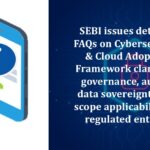Securities and Exchange Board of India (“SEBI”) through a Circular dated 13th August, 2020 has issued procedures for handling complaints by the stock exchanges as well as Standard Operating Procedure (“SOP”) for actions to be taken against listed companies for failure to redress investor grievances.
Background
This Circular has been issued in continuation of the earlier SEBI circular issued in March 2018, under which the procedure for filing and redressal of investor grievances using SCORES was detailed out. The Circular is also in continuation of the SEBI circular dated January 22, 2020 where the penalties that are to be levied for violating SEBI (Listing Obligations and Disclosure Requirements) Regulations, 2015 and the Standard Operating Procedure to be followed by the Recognized Stock Exchange in case of non-compliance of the same is provided.
Under the present circular, the procedure for handling complaints by the stock exchanges has been laid as well as SOP for actions to be taken against listed companies for failure to redress investor grievances. The procedures are as follows –
Handling of complaints by stock exchanges
1. Stock exchanges will be the first recourse for certain categories of complaints against listed companies. The nature of complaints for which the Circular is applicable is mentioned in Annexure – 2 of the Circular.
2. Investors are encouraged to initially take up their grievances for redressal with the concerned listed company directly. SCORES platform can also be used to submit grievances directly to the company for resolution, if the complainant has not approached the company earlier. Companies are expected to resolve the complaint directly.
3. IA company must redress the complaint within 30 days from the date of receipt of the complaint, failing which the complaints will be forwarded to Designated Stock Exchange (“DSE”) through SCORES.
4. At the time of lodging the complaint through SCORES platform, in case the complainant had approached the company earlier, the complainant shall submit all such details of the complaint in SCORES i.e., period of cause of event, date of grievance taken up with the entity, address of the company corresponded earlier, etc. Such complaints shall be forwarded to the DSE.
5. Upon receipt of the complaint through SCORES platform, the DSE will take up the complaint with the company. The company must redress the complaint and submit an Action Taken Report (“ATR”) within 30 days from the date of receipt of such complaint.
6. In case the ATR is not submitted by the company within 30 days or DSE is of the opinion that the complaint is not adequately redressed and the complaint remains pending beyond 30 days, a reminder will be issued by DSE to the listed company through SCORES directing expeditious redressal of the grievance within another 30 days.
7. If the stock exchange is adequately satisfied with the response of the company, it will submit the ATR to SEBI.
8. Appropriate action against the listed company will be initiated by the stock exchange for failure to redress investor grievances pending beyond 60 days.
Action for failure to redress investor complaints
1. Stock exchanges will levy a fine of Rs. 1000 per day per complaint on the listed entity for violation for failure to expeditiously redress investor compliant.
2. Fines will also be levied on companies which are suspended from trading.
3. DSE will issue a notice to the listed entity intimating them about the levy of fines while also directing them to submit ATRs on the pending complaints and payment of fines within 15 days from the date of such notice.
4. If the listed entity fails to redress the grievances and/or pay fine levied within 15 days from the date of such notice, the concerned DSE will issue notices to the promoters of such entities, to ensure submission of ATRs on the pending complaints and payment of fines by the listed entity within 10 days from the date of such notice.
5. If the listed entity fails to comply with the requirement and/ or pay fine levied within the stipulated period as per the notices, the DSE will freeze the entire shareholding of the promoters and promoter group in such entity as well as all other securities held in the demat account of the promoter and promoter group.
6. The depository(ies) will immediately freeze such demat accounts and also intimate the promoter(s) about the details of non-compliances resulting in freezing of their demat accounts.
7. In case listed entity fails to pay the fine or resolve the complaint despite receipt of the notice, the DSE may initiate other action as deemed appropriate.
8. While issuing the aforementioned notices, the DSE will also send intimation to other recognized stock exchange(s) where the shares of the non-compliant entity are listed.
9. Once stock exchange(s) has exhausted all options and if number of pending complaints exceed 20 or the value involved is more than Rs. 10 lakhs, stock exchanges shall forward the complaints against such listed companies to SEBI for further action, if any.
10. Stock exchanges may deviate from the above steps, if found necessary, only after recording reasons in writing. They must also intimate SEBI through SCORES about all actions taken against the listed company for non-resolution of the complaints and non-payment of fines.
11. Fine shall be computed and levied on a monthly basis during the non-compliance period.
12. Fine amount shall continue to accrue till the date of redressal of grievance /filing of ATR by the company or till the company is compulsorily delisted, whichever is earlier.
The time-line for handling complaints along with timelines on the actions to be taken by stock exchanges for non-resolution of investor grievances is provided in Annexure – 1.
Action after redressal of investor grievance by the company
1. Company will be treated as compliant if it has redressed investor’s complaint and has paid fines (if any) levied.
2. In case the promoters’ shareholding is frozen by the Exchange, an intimation will be given to depositories to unfreeze the promoter / promoter group holdings from the date of such compliance.
3. If the company has redressed the investor’s complaint but has not paid the accrued fines, the Exchange will stop levying further fines. However, the promoters’ shareholdings will remain frozen till the payment of accrued fines.
4. If the company has not redressed the investor’s complaint but has paid the accrued fines, the Exchange will continue to levy the fines and may initiate action as deemed appropriate.
5. The recognized stock exchanges shall take necessary steps to implement this circular. The recognized stock exchanges shall disclose on their website the action(s) taken against the listed entities for non-compliance(s) with grievances; amount of fine levied, details regarding the freezing of shares, compliance etc.
Please note that the recognized stock exchanges may keep in abeyance the action against any non-compliant entity or withdraw the action in specific cases where specific exemption from compliance with the requirements under the Listing Regulations/moratorium on enforcement proceedings has been provided for under any Act, Court/Tribunal Orders etc.
This Circular will come in force from 1st September, 2020.
Source : Securities and Exchange Board of India




